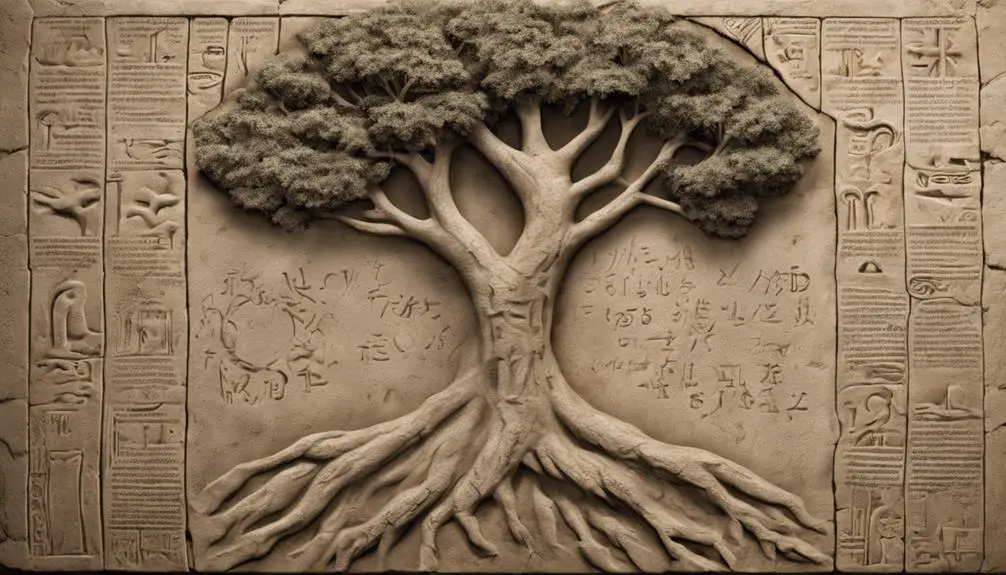Yearn to understand the timeless strength drawn from Philippians 4:13? Unearth its historical significance and impact on your life today.

A Verse From the Bible About Strength
Imagine you're a knight, armor shining, in the middle of a medieval battlefield. You don't have a smartphone to Google motivational quotes, but you do have the Bible. One verse, Philippians 4:13, states, 'I can do all things through Christ who strengthens me.'
It's a quote that's traveled through centuries, providing a beacon of hope and resilience. But, what does it truly mean? How has it influenced history and how can it impact your life today?
To find the answers, you'll need to embark on an exploration of this powerful verse.
Key Takeaways
- Biblical strength is a divine gift, symbolizing moral integrity, resilience, and trust in God's power.
- Historical context, theological understanding, and metaphoric interpretation enhance comprehension of strength-related Bible verses.
- These verses have significantly influenced social, political, and personal situations, symbolizing courage and providing inspiration.
- Daily application of these verses can boost emotional intelligence, patience, resilience, and overall psychological well-being.
Understanding Biblical Strength

To fully grasp the concept of strength as portrayed in the Bible, it's crucial to delve into its original Hebrew and Greek contexts, analyzing how the term has been employed in various passages. The term for strength in Hebrew, 'chayil', often denotes military prowess or valor, but also encapsulates moral integrity and wisdom. In Greek, the term 'dunamis' conveys the idea of power, might, or force, yet it also alludes to the miraculous power of God.
In the Old Testament, strength is often linked with God's power and protection. It's seen as a divine gift, a sign of God's favor. In the New Testament, strength acquires a more spiritual dimension, representing the inner fortitude granted by God to face trials and hardships.
It's also essential to understand that biblical strength is often synonymous with trust in God. It's not about physical power or self-sufficiency, but about reliance on God's might and grace. This understanding of strength underscores the Bible's emphasis on humility, dependence on God, and spiritual resilience. In this context, strength becomes a testament to one's faith and devotion, rather than a mere physical attribute.
Contextualizing the Chosen Verse

Now, let's delve into the context of the selected verse, understanding not only its literal meaning but also its historical, cultural, and theological implications. Immerse yourself in the backdrop of the scriptural passage, as context plays a crucial role in biblical interpretation.
When looking at the verse's historical context, consider who wrote it, to whom it was written, and the circumstances surrounding its writing. For instance, was it penned during a time of war, peace, or societal change? These factors influence the message conveyed.
Furthermore, understanding the cultural context aids in comprehending the practices, customs, and societal norms during the time the verse was written. Language nuances, idioms, and metaphors are all part of this cultural backdrop.
The theological context, on the other hand, relates to how the verse fits into the broader biblical narrative. Does it align with or challenge prevailing theological perspectives of the time? How does it contribute to the overall theological message of the Bible?
Interpreting the Verse's Message

Interpreting the verse's message requires a thoughtful and meticulous examination of its text, with a deep dive into the nuances of its language and symbolism. The process isn't simply reading the words, but about understanding the inherent meaning and implications.
To start, you must dissect the verse, word by word. Look for potential metaphors and allegories, as the Bible frequently uses such literary devices. Explore what these symbols could mean within the context and the overall theme of strength. Remember, it's not about what you think at first glance, but what deeper truths the verse could be conveying.
Next, consider the emotions and sentiments expressed. Are they of resilience, perseverance, or spiritual fortitude? This could help you discern the kind of 'strength' being referenced – physical, mental, or spiritual.
Lastly, take into account the intended audience of the verse. Consider their circumstances and the challenges they might've faced. The verse's message of strength might've been tailored to resonate with them specifically.
Historical Impact of the Verse

Throughout history, the profound impact of this verse has been evident in various social, political, and personal contexts, shaping the course of events and influencing individual perspectives on strength. It has shown its reach in all corners, from royal courts to humble dwellings, from grand revolutions to delicate personal transformations.
Consider how the verse has been used as a rallying cry during times of war or social upheaval. It's been a symbol of resilience, invoking courage in the face of adversity. It's bolstered the spirits of the oppressed, giving strength to movements for social justice and equality. Its impact isn't just on a macro scale, but also in the lives of individuals.
The verse has offered solace and fortitude to those battling personal challenges, such as illness or grief. It's been a source of inspiration for leaders, influencing their decisions and policies. It's even permeated the arts, inspiring countless works of literature, music, and visual art.
Despite its age, the verse's influence hasn't waned. It continues to resonate, illustrating the timeless nature of its message about strength. Its historical impact is a testament to its enduring relevance and power.
Personal Applications Today

Drawing from its historical influence, you can apply this verse in a personal context in today's world to help face various challenges with renewed strength. Let's consider, for instance, the social pressures and emotional turbulence one might encounter daily. The verse's emphasis on divine strength can serve as a beacon during these demanding periods, reminding you that you're not alone in your struggles.
In your professional life, you may experience significant stress or face seemingly insurmountable tasks. Here, the verse can prove instrumental in fortifying your resolve and maintaining your morale. By consciously invoking its message, you'll effectively tap into a reservoir of spiritual strength, fostering resilience and perseverance.
The verse's relevance extends to your interpersonal relationships as well. Should conflicts arise, the verse encourages patience, understanding, and the strength to forgive, facilitating healthier and more harmonious interactions.
In essence, the verse's timeless wisdom can be a potent tool in your personal growth and psychological well-being. By integrating its teachings into your daily life, you'll not only navigate life's challenges more effectively but also enhance your capacity for empathy, resilience, and emotional intelligence.
Conclusion
In understanding this biblical verse about strength, you've contextualized and interpreted its message, appreciated its historical impact, and applied it personally today.
Remember, the Bible's strength lies not just in its words but also in its power to inspire and guide. It's not a static text, but a living guide that speaks to different people in different ways.
Your exploration of this verse should empower you to continue seeking wisdom from these sacred texts.



Sign up